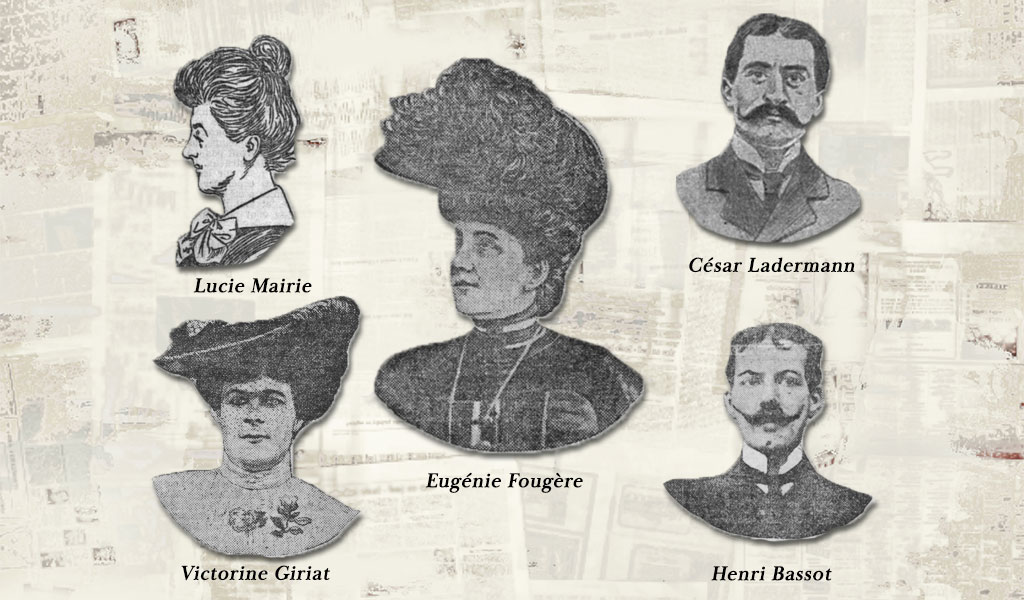
Murder in Aix-les-Bains: the betrayal of a courtesan
Summer season in Aix-les-Bains was drawing to a close but the crowds of the beautiful and the wealthy were out in force at the theatre this Saturday night in September, 1903. The charming spa town in eastern France with its thermal waters, lake, cafés, theatres and parties had long been a favourite with high society. Queen Victoria, under the discreet name of Countess of Balmoral, was a regular visitor, as was the Aga Khan. Being noticed in the crowd at le Casino Grand-Cercle would have taken either extremely good or bad looks but for Eugénie Fougère it was definitely the former. At 42, “Fou-Fou”, as she was affectionately known, could still turn heads. Strikingly good looking, this former model was always fashionably dressed and dripping with jewels.
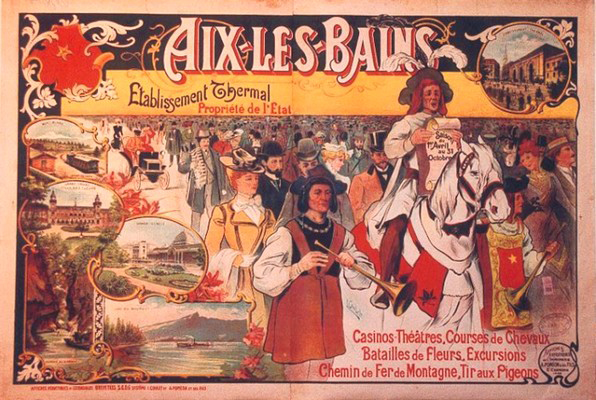
For Eugénie, attending the theatre wasn’t just about seeing the latest play; she needed to be seen and admired. To be blunt, she needed a new lover, one who would sponsor her lifestyle. Eugénie was a demi-mondaine – a kind of courtesan or professional mistress of rich men during the Belle Epoque. While there were thousands of prostitutes living destitute lives at this time, Eugénie was in a far different class. Her status as a demi-mondaine put her into a very small and elite group of women. To be successful at attracting the richest, most influential men, these courtesans had to be more than beautiful and sexually alluring, they had to be cultured, able to engage in conversation about a wide range of topics, be polite in any society and – of course – be expensively dressed at all times. They were both admired and reviled by French society. A threat to traditional family life but too powerful to be ignored, they occupied a kind of in-between space – hence the name “demi-monde” (half world) coined by Alexandre Dumas Jr.
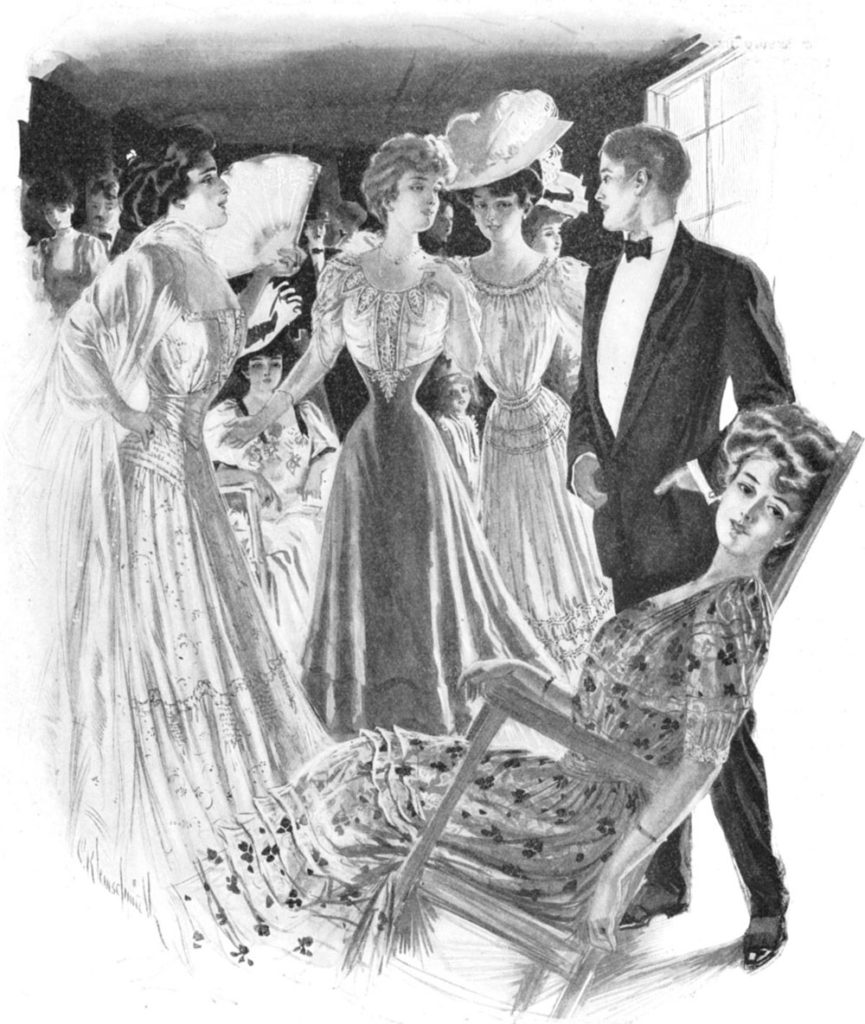
Eugénie’s most recent lover, a Russian general, had recently broken off their relationship and it was vital that she replace him. While she was richly clothed and her apartment in Paris was decorated with works of art, the truth was that her bank account was almost empty and bills from shops and dressmakers littered her desk. Eugénie wasn’t daunted. She knew that, far from economising, she had to spend to keep up appearances. She had an appointment with her dressmaker in Paris to make her wardrobe for the winter season in Monte Carlo and another with her hairdresser for the next day. She had been playing this game for 20 years and was nobody’s fool.
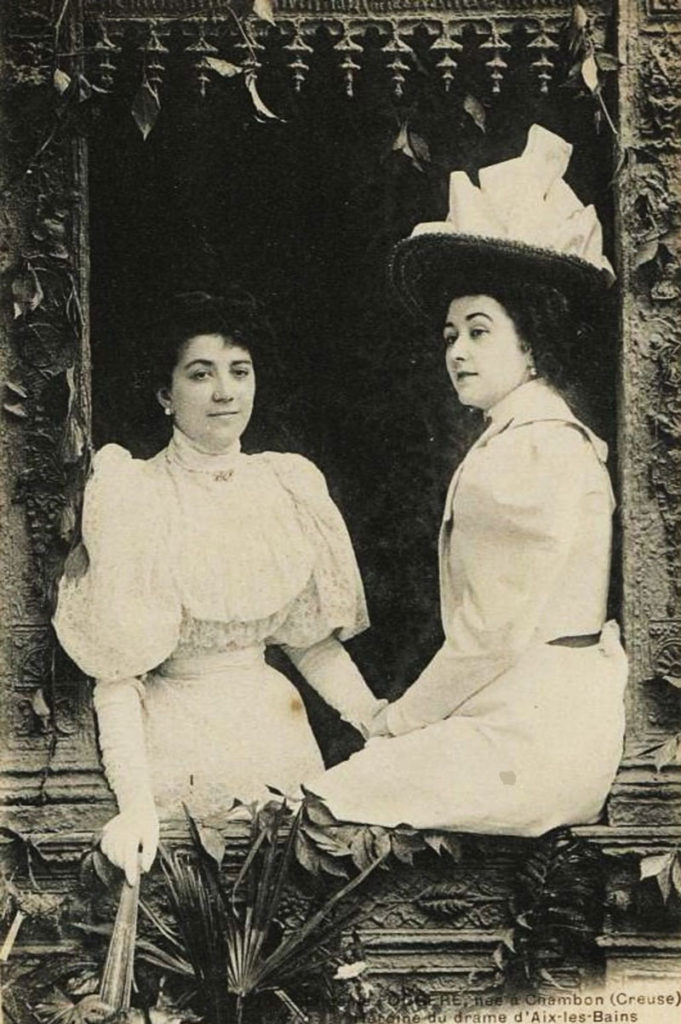
Born in a small town in the Creuse department of central France, Eugénie had been a maid and a waitress, earning her the nickname “Miss Chocolat” in reference to her dark brown hair. At 20, she followed a lover to Paris where, with her good looks, she became a model for some of the great fashion houses. There followed other lovers, including a rich American who took her to Brazil for four years. It was true, however, that she was entering middle age in a profession where looks were of premier importance. Things hadn’t been going great for Eugénie lately – she had even begun using opium and ether. She needed a new lover – and fast.
And so to Aix-les-Bains where she had rented a luxury home, “la villa de Solms” for the season. With her was her lady’s companion Victorine Giriat, 35, an old acquaintance from Paris that she had employed a few months earlier. (Even demi-mondaines can’t go about in public alone!) Victorine accompanied Eugénie to the theatre that evening to see a performance of Détour. The women returned to the villa at a little before one o’clock in the morning. The villa was quiet, Eugénie’s maid Lucie Marie, 22, having gone to bed earlier. Victorine helped her mistress prepare for bed, then retired herself.
The next morning at 8.15 am, Eugénie’s hairdresser Jean Pelletier, 42, arrived at the villa as arranged. He rang the doorbell but no one answered, which was unusual for this hour of the day. He decided to leave but, as he made his way around the building, he saw a group of men with a ladder against the wall. Initially he presumed them to be burglars but, looking up, he saw why they had a ladder. A woman was at a first floor window, gagged and tied up, and clearly greatly distressed. It was Victorine Giriat, Eugénie’s companion. One of the men – they were passersby – managed to reach her and let the others into the house. While they helped Victorine, Pelletier went from room to room to establish what had happened. On the ground floor in one of the bedrooms, he found the housemaid Lucy Mairie dead in her bed. She had been tied up and strangled with a towel. Pelletier continued upstairs and entered Eugénie’s room. It was in a state of great disorder, with furniture overturned and the contents cupboards and drawers emptied onto the floor. Eugénie lay on her bed, dead, evidently after a great struggle. She too had been tied, gagged and strangled.
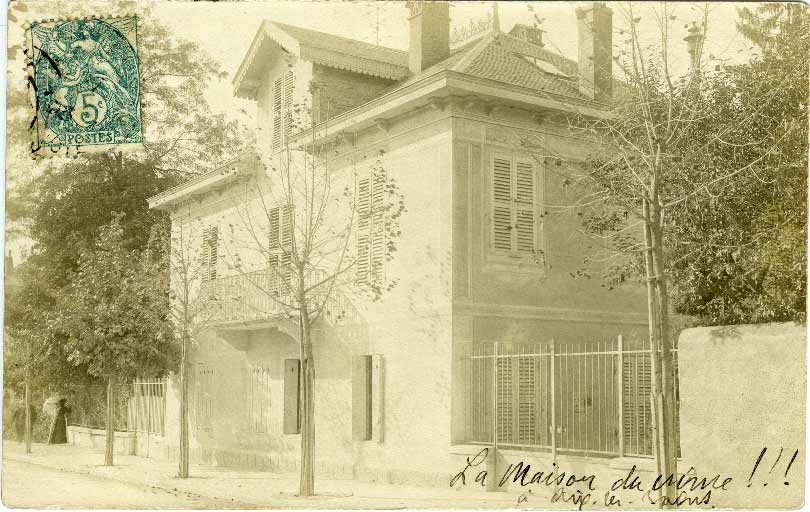
(Auteur: Fouger François – reproduction)
The police were summoned and investigations into the double murder began. The motive was clear enough. Whoever had committed the crime had ransacked Eugénie’s bedroom and made away with jewellery worth 300,000 francs (3.25 million GBP / 4.34 million USD in today’s money). The missing pieces included necklaces, rings and earrings decorated with diamonds, rubies and emeralds; the most expensive piece was a necklace containing 675 pearls.
Fortunately there was a surviving witness to help the police. Victorine Giriat was in a terrible state – at times barely conscious – but was eventually able to give an account of the events. She told police how both she and Eugénie went to bed after returning from the theatre but that she was awoken by footsteps in the hall at around 3 o’clock in the morning. Thinking that her mistress was perhaps ill, Victorine had risen to see if she could help. No sooner had she left her bedroom on the first floor when she was grabbed by two men who snuffed out her candle, then bound and gagged her. She fainted from fear. This, she speculated, is what saved her: her assailants must have believed her to be dead.
Autopsies were carried out on the bodies of the two women and a surprising fact was established. Lucie Mairie was killed at about 11 pm – much earlier than her employer whose time of death was put at about 3 am. This meant that the killers must have entered the property, killed Lucie, then lain in wait for Eugénie to return from the theatre. It would have been much simpler to kill Lucie, take the jewellery from Eugénie’s bedroom, then escape before she came home. The only conclusion could be that they knew that Eugénie would be wearing valuable jewels that night and that they wanted those too.
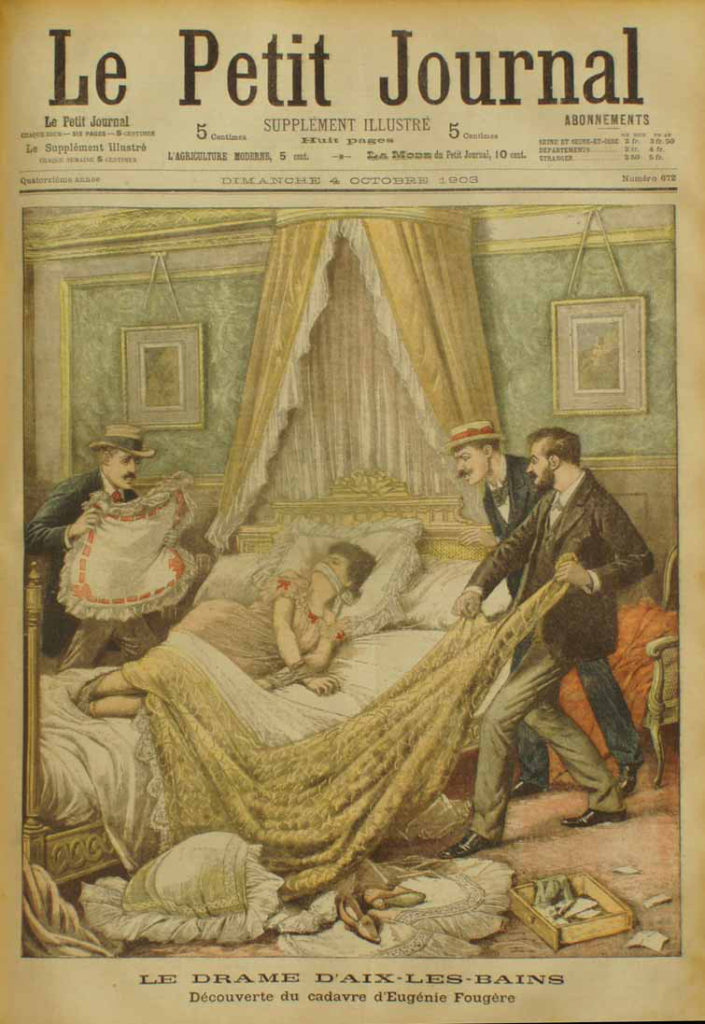
News of the murders made its way onto newspapers across the country. Two women attacked, robbed and murdered in their own home would be news at any time but added to the fact that one of them was a fashionable member of the demi-monde, a glamorous figure whose image could be reproduced in print made the story even more enticing. Adding to the confusion of the early days was the fact that Eugénie Fougère shared the name of a singer and dancer. The two had even lived on the same street in Paris at one point. News that the entertainer was dead shocked the patrons at Maxim’s where she performed.
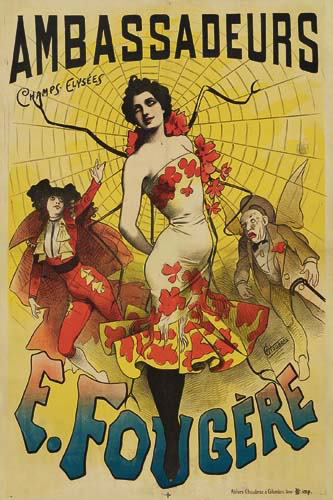
The police’s task was not an easy one, made all the more difficult by the fact that Aix-les-Bains was full of tourists at this time of year. Victorine, who by now had recovered enough to return to Paris, had been unable to provide a description of the men. After investigating reports of suspicious men seen in the vicinity of Villa de Solms and ruling out Eugénie’s lovers (details of whom had been found in incriminating letters in her Paris home) the police’s prospects weren’t looking too favourable. Their luck, however, was about to change.
It was mid-October when, on an unrelated matter, police raided a brothel in Aix-les-Bains. One of the women working there offered to give information about the murders in exchange for charges against her being dropped. She claimed that her lover had boasted that he was responsible for the crime. His name was Henri Bassot.
Bassot was already known to the police. Despite being born into a comfortable background (his father was a banker), at 32 he already had convictions for gambling, pimping and counterfeiting silver coins. Detectives tracked him down in Paris but, when they spoke to him about the murders, he was unconcerned. He had been on a train from Vichy to Paris at the time of the killings and had the ticket and witnesses to prove it. It wasn’t over for him though. Because at the same time police received the tip off about Bassot, they received another from a different source about Victorine Giriat.
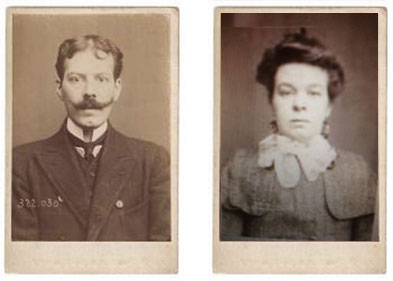
Giriat, for the past few weeks, had been in Paris having made a remarkable recovery from her injuries and was generally living the high life in the bars, theatres and casinos. She had also been rather indiscreet with one of her confidants, confessing that she was involved in the robbery and murders. It seemed that Victorine had also been a demi-mondaine, though not in the same league as Eugénie, and she thought her confession to this woman – a fellow demi-mondaine – would remain a secret. She was mistaken. This woman passed on the following tale to the police.
Victorine recounted that she had met and fallen in love with a man in Vichy – a certain Henri Bassot. Together they had planned to rob Eugénie of her jewels. Victorine had even engineered the meeting with Eugénie in the spring of 1903 and told her a tale of her misfortune – the two had known one another through their shared professions – and Eugénie, taking pity on Victorine, had taken her on as a lady’s companion. The plan initially had been to use chloroform to knock out both the women but this hadn’t worked out. Henri had then written to Victorine telling her that he would send un costaud (“a strong man”) to do the job for her. The plan was set.
Victorine and Henri were both arrested. Henri maintained that he had nothing to do with it but Victorine soon broke down under questioning and admitted that she and Henri had plotted together, largely verifying the account of events that her friend had given the police. In her version, she had believed that they were only going to rob Eugénie, not kill her and the maid, and that her role was simply to take the jewellery and pass it to a man waiting in the garden.
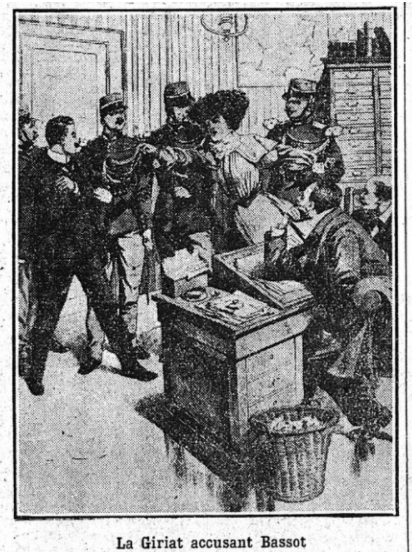
While Henri may not have been there on the night, the police had evidence of his involvement in the form of letters and telegrams sent to Victorine detailing the plot. All that was left was to find the “strong man” that Henri had arranged to help Victorine.
The investigators began looking into Henri’s circle of acquaintances in Lyon. Among them, a man called César Ladermann, 34, stood out as a person of possible interest. When the police went to question him, however, things took an unexpected turn. Before they were able to enter his apartment, César shot himself, dying instantly. The police had found their man, though tragically too late.
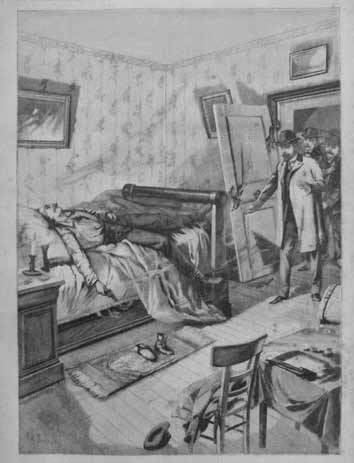
César’s brother, Édouard, was questioned by the police and he told them that César regretted his involvement in the crime in Aix-les-Bains and couldn’t face a lengthy prison sentence or life on the run. His brother advised him to take matters into his own hands.
As far as the case was concerned, the loss of one of the suspects was a huge blow. Fortunately for the police, they had the testimony of César’s brother, to whom he had confessed. But, even better than that, César left behind a letter addressed to the police explaining what had led to his suicide. The information contained within painted events in an entirely different light. He claimed that Victorine had carried out the murders herself.
From César’s perspective, he was little more than a bit player. From the grave he pointed the finger firmly at Victorine. She killed Lucie, returning from the theatre during the interval to do so. She robbed and killed Eugénie, waiting until her mistress was asleep and vulnerable. While all this was going on, César was waiting outside in the garden. He only came into play when Victorine passed the jewels to him, then ordered him to tie her up and make her look like a victim. “Look at my work,” Victorine boasted as she showed César the corpses.
The police now had enough evidence to charge Victorine Giriat and Henri Bassot. While Victorine broke down, Henri sent a letter to his mother asking to be sent chocolate and caviar.
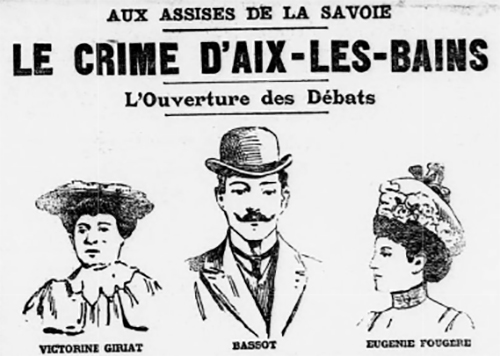
On 1 June 1904, the trial began at the Crown Court in Chambéry, Savoie. Three people were accused in the affair. Alongside the two main defendants was another man whose involvement was yet another twist in the already bizarre tale – and it related to the jewels.
On 1 November, Charles Robardet, a railway worker, was walking with his family along the banks of the river Saône when his wife literally stumbled upon a bag full of jewellery. It had been stuffed into a hole close to the river. Afraid at first of doing anything with the loot, Charles had simply hidden it at his home. Little by little, he began to sell small pieces in local jeweller’s. The temptation was too great: on the 30th of December, he tried his luck selling a more expensive item at a store in Neuville sur Saône, eastern France. The jeweller was suspicious of this clearly poor man having such a valuable piece of jewellery and alerted the police. Charles was arrested in connection with the robbery. Was he a fourth man – part of a wider conspiracy? Fortune was on Charles’ side once again. His account of finding the jewels tied in exactly with what César had recounted in his suicide note. He threw the bag with the stolen jewellery out of the window of a train onto the banks of the Saône, he said. Investigators concluded that Charles didn’t have any deeper involvement in the case. He was sentenced to three months for theft.
Victorine and Henri received far harsher punishments for their part. After a four-day trial, Victorine Giriat was found guilty of theft and the murder of Eugénie Fougère; she was sentence to 15 years hard labour. Prosecutors were unable to prove that Henri Bassot wanted the deaths of the two women; he was sentenced to 10 years hard labour for conspiracy and theft.
Without the third conspirator César Landemann to answer to the charges, many questions remain unanswered after the trial. What part each person played on the night remains unclear. Victorine was convicted of Eugénie’s killing but not Lucie’s – César’s claim that she carried out the murder during the theatre interval seems implausible to say the least. Eugénie’s death was a different matter. Though the manner of killing was similar, Eugénie’s death was a longer, more violent business. It seems that she fought for her life for around 20 minutes before succumbing. She had been both strangled with a towel round her neck and suffocated with a pillow. It was speculated during the trial that it would have taken two people to carry out the killing.
Henri Bassot married his mistress while in prison before being transferred to serve out his sentence in Guyane. He escaped from prison and made it back to France on a boat from Brazil, only to be stopped by the police on arrival at port in Le Havre. He was 45 at the time.
Victorine Giriat spent her prison sentence in Montpellier. She was last heard of when, shortly after her release in November 1917, she was arrested for shoplifting in a Paris department store.
SOURCES
For this post, I read this excellent piece on Le Dauphine by Sylvaine Romanaz: Du sang sur la saison mondaine : double assassinat à Aix-les-Bains and a very informative blog post on Aix-de-Bains de Sophie that really got me into the story early on. I also read numerous contemporary news articles about the crime and subsequent trial via RetroNews.fr. Wikipedia was, as ever, invaluable.



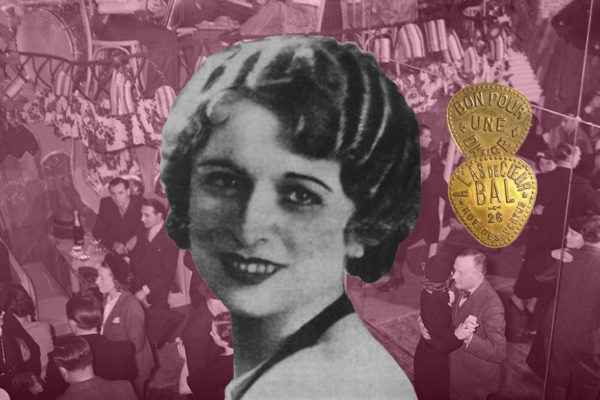

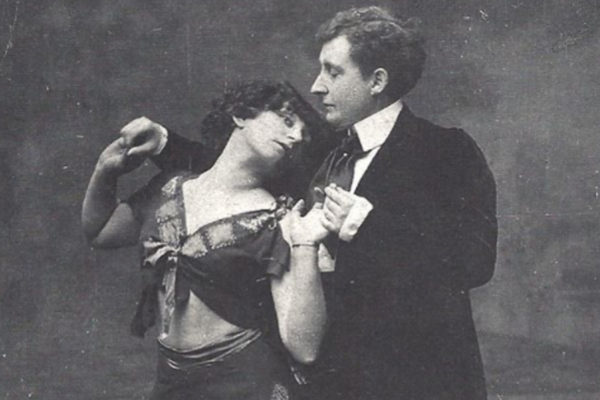
Al McKinnon, Calgary Canada
Great re-counting of a truly miserable betrayal crime and the subsequent somewhat lucky investigation, Jackie. And thanks for providing insights into certain aspects of French society at the time. The pix were cool, too. All the best. Stay healthy and safe.
admin
Thanks for the comment, much appreciated. Stay safe too!